.

Directors: Don Chaffey, Pat Jackson, Patrick McGoohan, Peter Graham Scott, David Tomblin
By Roderick Heath
The Prisoner, an epochal surrealist-satiric thriller series, feels as much a commentary on the television show itself as it is on politics or society: the construction of a bogus living space that’s constantly filmed; the random-seeming changes of cast; the ongoing, enclosed situation that may have no discernable outcome; the unvarying efforts to create and force story and character arcs and spark behaviours with predetermined ends whilst mimicking the happenstance flow of life. Quite apart from the anticipation of the inane horrors of reality television, even the episodes that bend the boundaries of genre, transposing the essential plot into Western and comic book settings, reveals the often interchangeable elements of sausage-factory entertainment. Star and co-mastermind Patrick McGoohan was partly inspired by his own exhausting workload on his hit show Danger Man. He and key collaborators George Markstein and David Tomblin presented a perfect metaphor for the way television, cranked out day and night, with shows that either run impossibly long or get cancelled before they can logically and succinctly end, becomes a kind of ongoing existential nightmare.
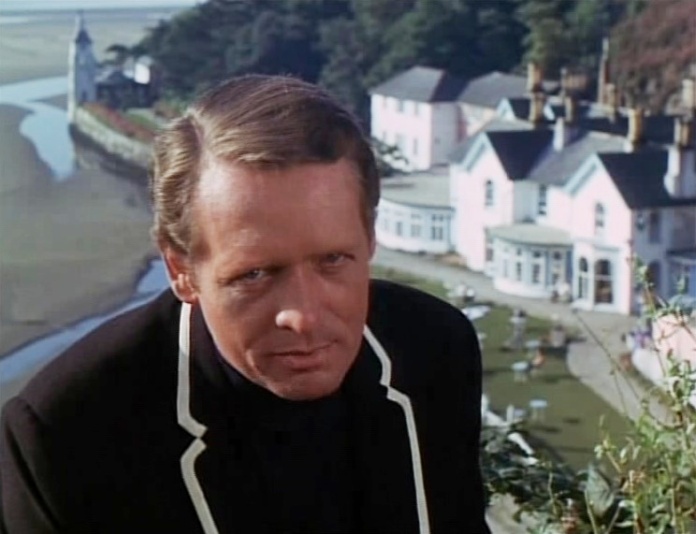
The Prisoner wasn’t one of those shows of the kind I’ve mentioned above; at just 17 episodes, it describes a fascinating and relatively contiguous narrative back when that was still a rare idea. McGoohan sold the concept of The Prisoner to ITV boss Lew Grade after considerable wrangling over how long the series would be, and the final episode count sports some obvious filler instalments towards the end (not to say they aren’t entertaining anyway). Although it’s not a uniformly executed unit, the core concept, and the way the major elements are introduced and illustrated, possess energy unique and obvious more than 40 years  later. I’ll try not to bore you with comments on how the show anticipated more recent creations like Lost, The X-Files, Twin Peaks, Dennis Potter’s works and myriad other permutations throughout popular culture (though I think I just did); the list of influences could go on and on, especially on scifi movies since the early 1970s. And that’s not to mention a pitch-perfect episode of The Simpsons in 2000, when about 80% of the audience would have had no idea what all those gags about Number Six were referring to.
later. I’ll try not to bore you with comments on how the show anticipated more recent creations like Lost, The X-Files, Twin Peaks, Dennis Potter’s works and myriad other permutations throughout popular culture (though I think I just did); the list of influences could go on and on, especially on scifi movies since the early 1970s. And that’s not to mention a pitch-perfect episode of The Simpsons in 2000, when about 80% of the audience would have had no idea what all those gags about Number Six were referring to.

It’s taken me a long time to catch up with the series, and the experience was certainly tinged bittersweet in finally watching it over a year after McGoohan’s death. McGoohan had a terrific, compact force as a screen actor, and even as late as Braveheart (1995), it was delightful to watch him galvanise a potentially flat role into something like delicious melodrama. The Prisoner’s later episodes were affected by McGoohan’s work on the film Ice Station Zebra (1968), which is chiefly worth watching today for the spectacle of McGoohan giving Rock Hudson an acting lesson. Considering the deep involvement he had in The Prisoner, it is, in its way, testimony to a talent that never was quite fulfilled—but then again the compressed brilliance of the series with its unmistakeable tropes and intricately orchestrated ideas was a hard act to repeat. The atmosphere of The Village, a fake community with its false front of jollity, jaunty uniforms, omnipresent sloganeering and surveillance, and the roaming, shapeless, unnerving “Rover” security guards, is minutely conceived and indelibly portrayed.
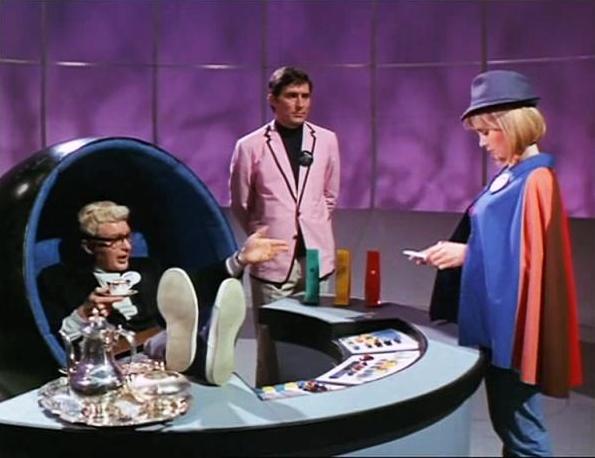
The Prisoner accounts the experience of its unnamed protagonist when, having abruptly quit his post with a British government intelligence service, he’s gassed and awakens some time later in a room that looks like his own home, but proves to be a replica. He’s now in The Village, a locality that soon proves to be both a jail and a home for “people who know too much or too little,” where prisoners and Guardians are indistinguishable except for certain elite members, and everyone has a number, not a name. Coded as Number Six, the hero contends with a power system that is arranged to flatten all resistance, and quickly distinguishes the few genuine rebels from natural conformists. Although he, because of his nominal importance, is spared most of the worst methods on hand, Number Six is still subjected to a merciless and gruelling procession of manipulations, plots, and scientific procedures to crush his spirit and extract his reasons for resigning. The Village is located on a remote island, and escape is virtually impossible thanks to the Rovers, giant plastic balls that swallow up escapees. In each episode, Number Six faces off against Number Two, the supposedly elected administrator of the island, but the person in the post in constantly changing and answers to a mysterious Number One and the rest of their organisation.
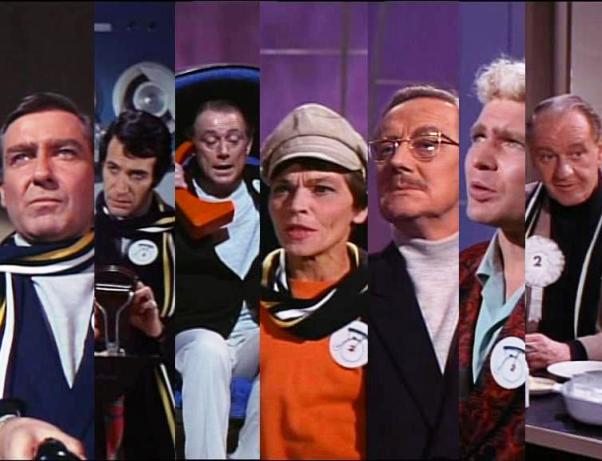
The first episode, ‘Arrival,’ establishes most of the essentials with clarity and a surprisingly cinematic style, with the rapid, choppy editing and forceful, almost abstracting camerawork offering an expressive intensity TV still doesn’t offer much. The debut was put together by Don Chaffey, who had directed Jason and the Argonauts (1963) for Ray Harryhausen and worked on several Hammer films. The filmic, pop-art-infused look and structure of the series is just one of its stand-out qualities, and though some episodes dip close to the look and plotting of more average action series like The Saint, The Avengers, and Danger Man itself, that’s more the exception than the rule. The bewildering clash of textures that is The Village—the faux-Italianate architecture of the town centre, the seaside pleasantness of the neighbouring port with its mocking fake boat, and ultra-futuristic hidden abodes of the Guardians—establishes the matryoshka-like multiplicity of hidden truths. A serious question for Number Six is whose “side” runs The Village. Although clearly still conceived in the schismatic structures of the Cold War, the “sides” are kept purposefully vague, and soon enough, the notion that there are or soon will be no sides, that The Village is the future world in miniature, is introduced with relish by one of the Number Twos. A distinct pleasure of the show, over and above its Byzantine complications, is the impressive array of then-contemporary British acting talent, with the likes of Eric Portman, Leo McKern, Derren Nesbitt, George Baker, Guy Doleman, and Mary Morris popping up throughout, particularly in the Number Two spot.
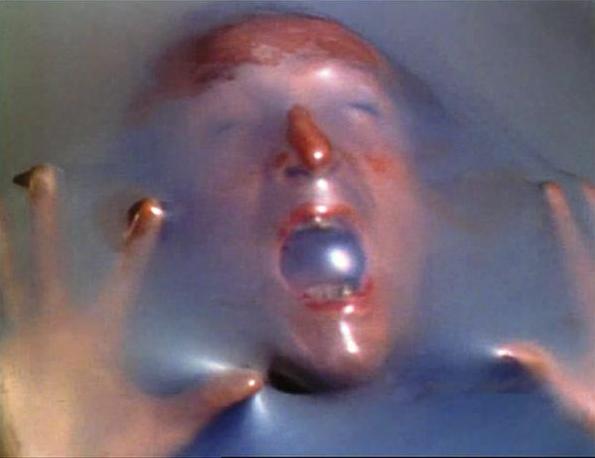
It’s bordering on the obvious to say that aspects of The Prisoner are certainly late-’60s modish, with aspects of its style and satirical approach now hackneyed. And yet, in other ways, it’s even more relevant today than when it was made, now that Britain’s been turned into a giant CCTV playground, the spectacles of Guantanamo Bay and the War on Terror’s renditions, and an increasingly high level of distracting gibberish infuses contemporary media and political sources. The dark heart of The Village’s purpose is glimpsed in brief, but telling vignettes when Number Six visits the hospital and sees people being subjected to therapies to make them compliant members of the society—methods that both take aim at quack psychiatric practises of the era, such as the aversion therapies being inflicted on homosexual people, and also anticipating today’s “enhanced interrogation techniques.” The image of the prisoners caught by a Rover, their faces distorted in terrified masks while being smothered by plastic, is a grotesque one. The show’s opening credits are ritualised in depicting Number Six’s kidnapping, turning his plight into an Oroborus-like experience of constantly awakening in the strange locale, his shout of “I am not a number, I am a free man!” met with the hilarity of whoever’s Number Two that week.
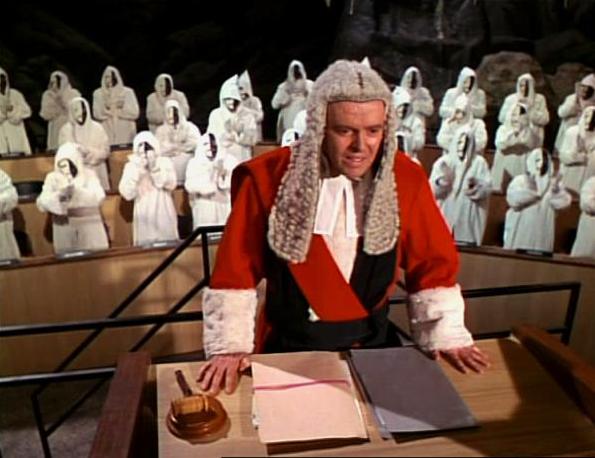
Whilst Number Six is supposedly being saved from the worst punishments of the operation, the cruelty that is part and parcel of The Village (underneath the smiling threat of the Number Twos and the stern, hysterical outrage of the citizens’ committees, and inherent in the various manipulations enforced on Number Six) is mind-boggling—at one point, in ‘Many Happy Returns,’ he’s allowed to escape the island temporarily as a mocking birthday present. And yet the series suggests many people put up with such sadisms every day and call it being a member of society. Not all the anticipations are negative: it’s hard to believe that modern internet-fuelled alternative culture wasn’t anticipated and indeed partly based on Number Six’s methods, and also those of his fellow prisoners. In ‘It’s Your Funeral,’ the villagers who are still resisting indulge in a game they call “jamming” (hence the ’90s fad for anarchic “culture jamming”?), feeding the authorities disinformation: “It’s one of the most important ways of fighting back!” declares one participant (Annette Andre). But their need to muddy the waters is then used by their enemies for their own ends.
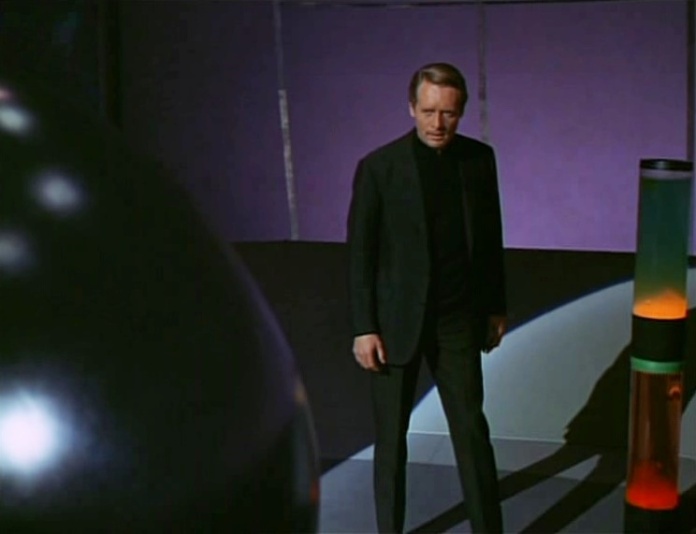
Whilst Number Six is an empathetic hero, the notion he’s not all that much different to his oppressors is repeatedly mooted. Thanks to McGoohan’s superlative, sustained performance, he’s cool, relentless, and aggressive, self-satisfied in his public schoolboy ideal of rugged individuality, seemingly as asocial outside The Village as in it. His private war with the world is only literalised when he’s put there, a notion that echoes when he finally escapes the island in the last episode, but with the world now taking on aspects of The Village. McGoohan’s extremely Catholic dislike of playing love scenes means the only time Number Six kisses a woman is when his mind’s been transferred into another body (that of Nigel Stock) and then it’s a fiancée (Zena Walker), daughter of his boss, who hadn’t been mentioned before; that aspect only reinforces the miasma of alienation that surrounds Number Six. In ‘Checkmate,’ Number Six puts together a cabal of resistors after developing a method to discern prisoners from jailers though their behaviour, only to have his escape plot foiled when his people turn on him because he acts more like a Guardian. In ‘Hammer Into Anvil,’ Number Six is at both his most righteous and most vicious: he uses the atmosphere of paranoia, distrust, and elusive truth for his own ends, when he sets out to destroy the current Number Two (Patrick Cargill) after he causes the suicide of a woman he’s interrogating, by faking evidence that suggests Number Two is being plotted against by his own side, reducing his quarry to a quivering, hysterical mental wreck.

There’s a tone of satire of macho values and more specifically the action-man ethos of a lot of ’60s pop culture (McGoohan and Markstein disagreed for years afterwards as to whether Number Six was Danger Man’s protagonist John Drake), with the fact that Number Six is physically indomitable—a champion boxer and fencer, he never loses a fight where he isn’t outnumbered five to one—and yet this usually does him no good at all. In ‘A Change of Mind,’ he’s relentlessly hounded precisely because he resists a couple of bullies, a touch that might remind a few of us of high school. Number Six’s great mental fitness usually serves him better in resisting all the attempts to subsume his personality and distort his sense of reality, whether they involve fooling him into thinking he’s an impostor created by the Guardians to take on the “real” Number Six, in ‘The Schizoid Man’; making him think he’s undergone a behaviour-controlling lobotomy, in ‘A Change of Mind’; or, most bizarrely, feeding him full of psychedelic drugs and making him play out a western scenario, in ‘Living in Harmony.’ The latter episode introduces a particularly good performance from Alexis Kanner as The Kid, a young subordinate of Number Two posing as a hotshot gunslinger, who’s driven mad by that pose and kills a woman and then himself—only to be resurrected later as the spirit of youthful, countercultural rebellion.

Some of the show’s metaphors were corny even in its time—the characters being likened to chess pawns in ‘Checkmate,’ Number Six sabotaging The Village’s controlling supercomputer project by asking it the illogical question, “Why?”—but many others are still potent. In the pungently funny satire ‘Free For All’ (an episode McGoohan wrote and directed), Number Six is encouraged by the current Number Two (Eric Portman) to run for his job in the annual elections because his reputation as an aggressive resister lends the vote an veneer of authenticity. What follows analyses the processing of authentic statesmen into regulation politicians, as The Village journalist replaces his initial lack of comment into standard political cliché before he’s then drugged and brainwashed into speaking mindless rhetoric to wildly enthusiastic crowds. He wins the election, but then the woman (Rachel Herbert) who’s been his assigned driver throughout the campaign and has spoken only in foreign gibberish and acted childishly slaps him silly and imperiously takes Number Two’s chair. In ‘The Chimes of Big Ben,’ Number Six enters an art contest where all the other artists, having succumbed to the cult of star-fucking, have all produced works that idolise the only celebrity about—Number Two.
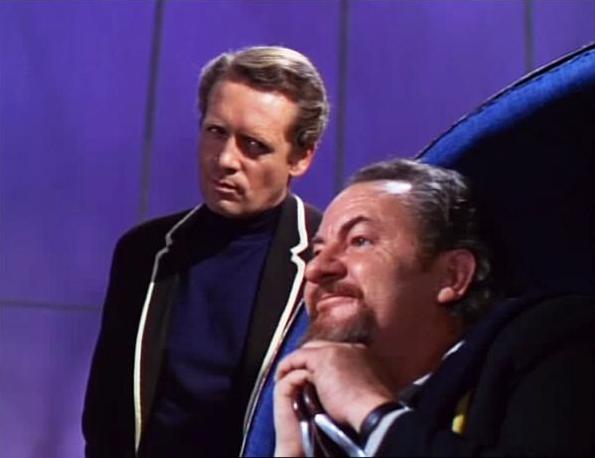
McKern was the obvious choice to bring back for the final two episodes, ‘Once Upon a Time’ and ‘Fall Out,’ where the series takes a wild swing towards allegorical surrealism and doesn’t come back: ‘Fall Out’ was nominated for a Hugo Award, losing out to 2001: A Space Odyssey of all things. McKern’s Number Two is brought back to break Number Six at all costs, with the death of one of them certain. Number Two tries to deconstruct Number Six by devolving his mind back to childhood and leading him through his experiences, only to find that Number Six’s presumed asocialness is actually derived from his social values, and his individualism finally triumphs. Number Two is revived, along with The Kid, as examples of failed rebellion to contrast Number Six, who’s presented to a bizarre cabal of masked people, each representing some segment of society, ready to accept him as ruler. But when he is ushered in to meet Number One, the head honcho proves to be a lunatic wearing a monkey mask, and the whole enterprise is a self-perpetuating delusion. The series resolves in a kind of hallucinatory anarchy close to that same year’s If…, as Number Six, Number Two, and The Kid machine-gun their captors to the strains of “All You Need is Love” and flee by a mysterious underground route directly into London. The technocratic world of the Guardians coalesces into a final vision of a madman blasting off into outer space, whilst the three rebels ride along the highway in a cage, dancing to “Dem Dry Bones.” It’s a finish that manages to be threatening and elating all at once, as close to genius as anything I’ve ever seen in television. l

I was almost scared shitless when the premier episode brought Rover practically into our living room, and then fascinated by it’s audacity – there was nothing else like it back then, and ever after. I watched every episode with increasing anticipation, each week extending the hope it never would end. I was intrigued, amazed, and hugely entertained, and even the ending had a wild anarchic air that I was satisfied with more than not. The costumes, the writing, and the acting was first-rate, with the changing of No. 2s bringing something new with every episode – and the episodic nature of it was perfect for the ratcheting up of tension.
It was a long time before I saw it again, and it was almost impossible to see for a very long time. When my brother was married on Halloween in the early 1980s, it was a costume wedding. I went out and bought an excellent coat at a thrift store for 50 cents, then had it trimmed in white, made a badge, got some deck shoes, stuck a skimmer on my head and bought a huge white balloon – yup, his best man was No.6, and brought Rover along, too. When I started going to Comic-Con every year, I would were that costume on Saturdays, and it’s been 20 some years now.
I was quite Prisoner fan, and ended up with many books and magazines about the show. McGoohan was a genius, IMHO. Great review, Rod!
LikeLike
This was obviously right up your alley, Vanwall! That may actually have been a wedding that I could have sat through.
As I was discussing with Marilyn some time before this was posted, the funny thing about The Prisoner is that it should be silly – and the Rovers most of all. But they’re not: they’re handled in just the right way to make them bizarrely impressive. It also helps that the show has just the right surrealistic sense of black humor that defuses any incredulity, like the bit in one episode where a Rover drags a dazed, sing-songy Number Six back to the island. Brit TV producers had a way of making things like that unnerving – just a couple of years after the Daleks first came along, after all.
Yes, the come and go of Numbers Twos helped keep things bubbling very nicely. I also noticed that, smartly, unlike so many other TV shows, the narrative arc of each episode varies; there’s no episode that facsimiles another unlike in, say, so many procedural shows. Sometimes the essential gimmick is repeated, but the power dynamics and the consequences always fluctuate and refuse to succumb to formula. The show was in constant movement. The short run definitely helped it in that regard.
LikeLike
Oh, yes, it’s viewed as a black comedy by many. I was a “hard” science fiction reader for many years during and before The Prisoner, and I was pretty critical of speculative fiction on TV and in movies, so I loved the portrayal of the everyday commonality of technology creep: constant surveillance, wireless phones, the Official Printing Font, the ubiquitous radios that didn’t turn off, the soft torture interrogations – all things that were sci-fi elements at that time, and damn, now that’s the way of us in our Villages! Gack!
LikeLike
Considering the deep involvement he had in The Prisoner, it is, in its way, testimony to a talent that never was quite fulfilled
I see this sort of thing said very often. McGoohan was 40 by the time he did The Prisoner. He’d had a phenomenal 20 year career already. In many ways he probably was only capable of such a genius piece of work because of what he had learned and experienced. His 80-hours or so of ‘Danger Man’ also stands worthy of a fulfilled career.
I think there seems to have been some sort of expectation over the years that he would become a Hollywood film star, but that seems never to have been what he wanted.
What made him special was that he worked out the trick of only doing what he wanted and was still phenomenally successful.
LikeLike
I was mesmerized by this show when it first aired. I’d never seen anything like it, but I was too young to really pick up on the social criticism. I rented it shortly after McGoohan’s death but found I couldn’t watch it straight through and didn’t get to the end. It’s commentary seemed so dated to me, though visually and from an acting standpoint, it was still stunningly good. I think I should have watched it one episode a week.
LikeLike
What a wonderful, wonderful piece, Marilyn! I, too, first saw the show when I was 10 or 11–during its first US broadcast–and loved the trippiness while not getting the seriousness. It made me a McGoohan fan for life (although I’d seen him fleetingly earlier in the few times I’d been allowed to stay up past my bedtime to watch “Danger Man” aka “Secret Agent”); that clipped, controlled, wry delivery coming out of that wrenchingly handsome face was a lifechanger.
Getting back to “The Prisoner,” however (ahem), I have to say this is the best appreciation of it I’ve ever read.
LikeLike
Karen, I agree. Kudos, however, go to my blog partner Rod for a great analysis and appreciation.
LikeLike
Rod, this latest review again demonstrates your ability to dissect, all within the parameters of deep appreciation. I didn’t see this series during it’s original run, but later, when it initially released on DVD. Like a number of others here I own the complete sets. McGoogan of course is exceptional, and while teh show is dated, the satire and metaphorical underpinnings are remain striking. Love that term “hallicinatory anarchy.” It is not an esey series to negotiate as it’s particularly cerebral and requires complete mental surrender, but it grows on you.
Again your descriptive writing is top-drawer. Ex:
” The atmosphere of The Village, a fake community with its false front of jollity, jaunty uniforms, omnipresent sloganeering and surveillance, and the roaming, shapeless, unnerving “Rover” security guards, is minutely conceived and indelibly portrayed..”
LikeLike
This is as near-perfect a show as you’re going to get. Amazing stuff and a fantastic analysis of it, Rod. Well done, sir!
I came late to the show, discovered it on DVD shortly before McGoohan died and pretty much took a whole weekend to watch every ep. There was something about watching a show like this in such a compacted time frame that really made a big impact on me.
Have you seen the AMC remake? I watched one ep. and couldn’t stand it. Awful and a pale imitation of the original. blech!
LikeLike
This is unrelated to Rod’s review, but rather concerns a review I thought Marilyn wrote weeks ago on GOD’S LITTLE ACRE. I saw the film as the first of a double feature last night at the Film Forum as part of their three-week long Anthony Mann festival. I though immediately of a review I could have sworn I read at this site (and I believe I commented on it too!) but my attempts to access it through the search have proved fruitless.
I wanted to add to my original remarks, but I may be losing it here! Ha!
Please advise.
LikeLike
I had a problem searching on that title – not sure why. So I searched on Anthony Mann and found it: http://www.ferdyonfilms.com/?p=578
LikeLike
I saw THE PRISONER’s pilot when it premiered on US tv back in the ‘sixties, and then again last year when it was re-introduced on cable. I thought my appreciation would have changed. As a kid, when the first episode finished, I thought to myself, “OK, he’s in a place from which he’ll never escape, so why tune any more to see him repeatedly try to get out of there, and never get any answers about his predicament?” Surprisingly, over 40 years later, I had the same reaction. I guess I’m just not its target audience.
LikeLike
watched this when I was a 15 year old kid at art school in ’67 . Didn’t know what the fuck it was about but didn’t care . we would do a post mortem on every episode every week in class when we were supposed to be drawing from dusty plaster casts or painting fruit bowls …… meanwhile in 2010 have some knowledge of Lacan , Lyotard et el and love the new series
LikeLike
Doug — my take on it wasn’t so much ‘every week he tries to escape and fails’, which I agree is a cheerless prospect, but more ‘every week they try to break him and he wins’, which made the protagonist a hero to root for.
The question of whether John Drake and Number Six are one and the same has always seemed pretty moot to me. The continuity of character and concerns always struck me as seamless, as if McGoohan picked up the persona and walked off one set and straight onto another. But he’d be the last person to be able to agree, because he didn’t own the character of Drake or the sequel rights to Danger Man. Instead he presented Number Six as an Everyman, which he also took as the name of his production company. An Everyman who just happened to walk, talk, think, act, and have the same employment history as his previous TV character.
LikeLike